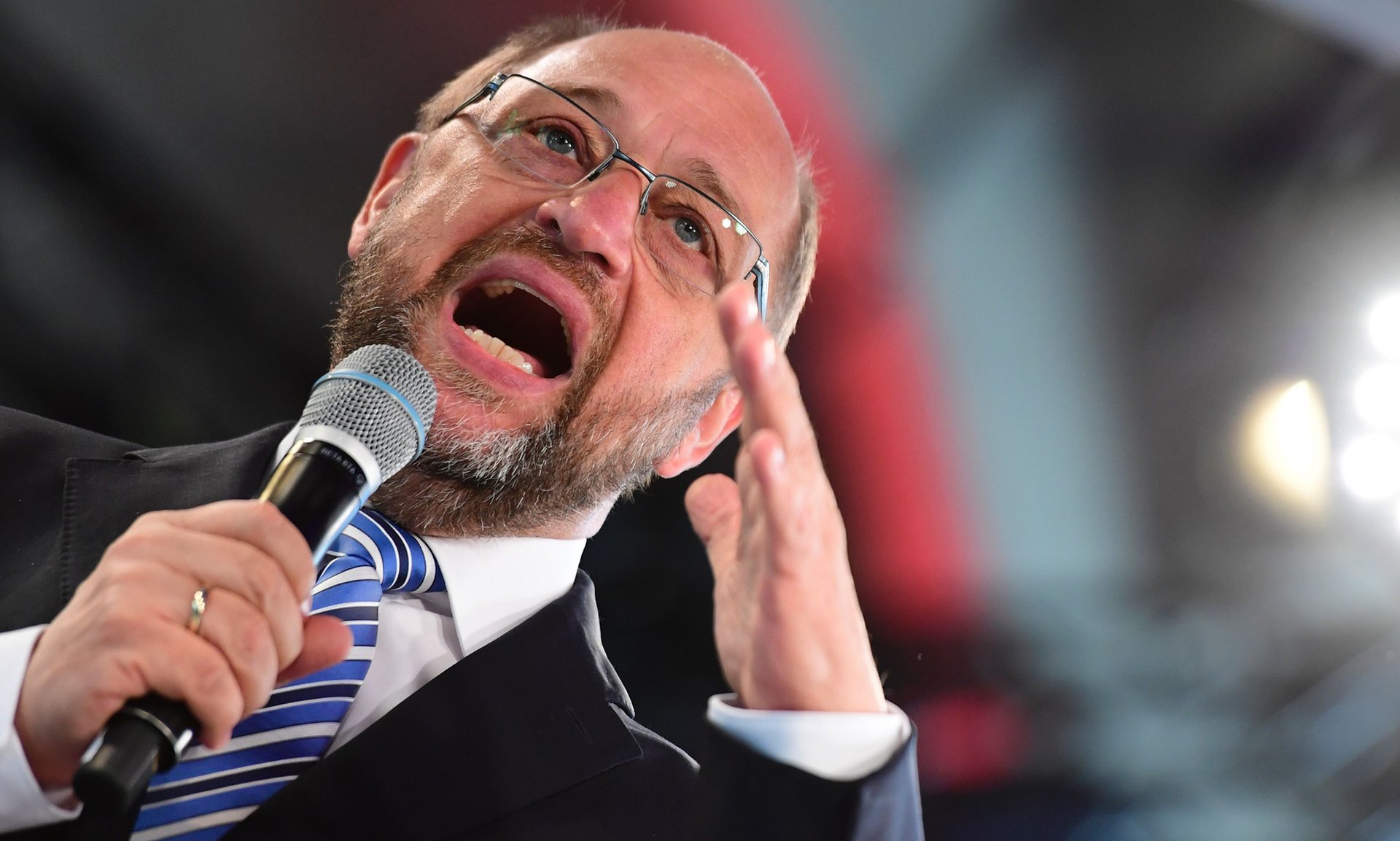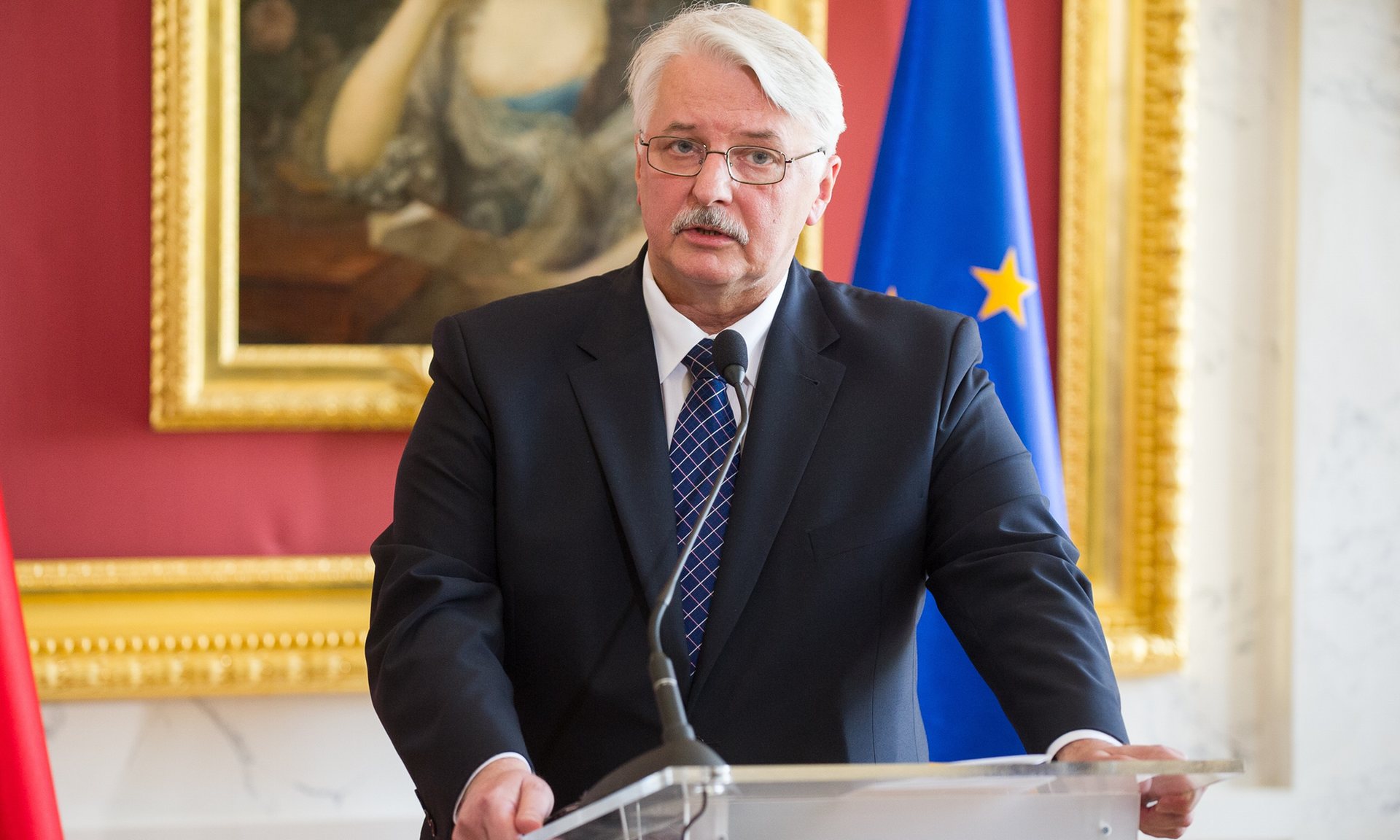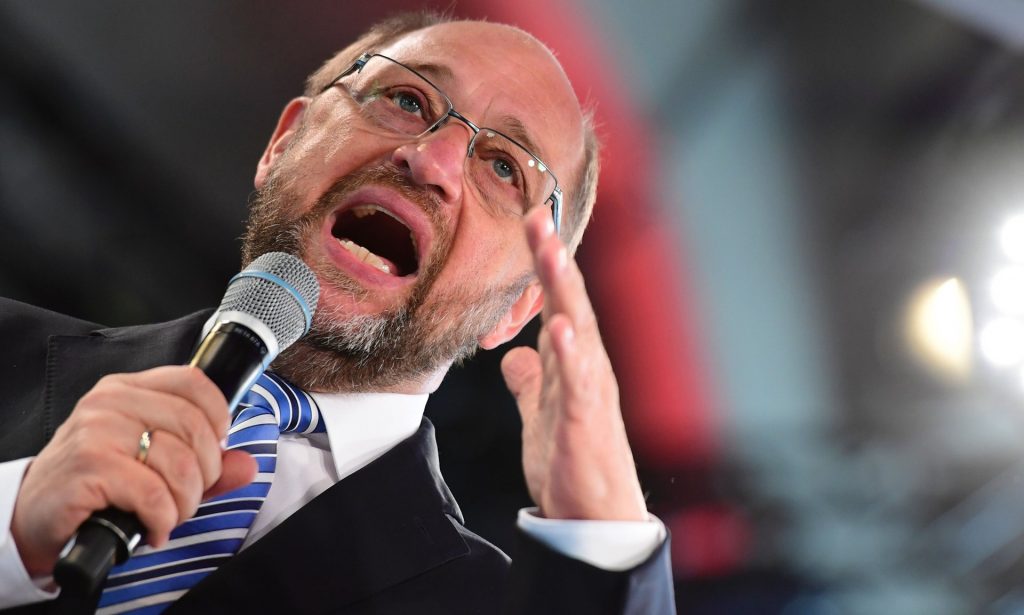
Photograph: John Macdougall/AFP/Getty Images
A senior EU leader has confirmed the bloc wants Britain out as soon as possible, warning that David Cameron’s decision to delay the start of Brexit negotiations until his successor is in place may not be fast enough.
Cameron announced on Friday morning that he would step down as prime minister by the autumn, after the British public caused a political earthquake by voting 52%-48% to leave the European Union.
Martin Schulz, the president of the European parliament, told the Guardian that EU lawyers were studying whether it was possible to speed up the triggering of article 50 of the Lisbon treaty – the untested procedure for leaving the union.
As the EU’s institutions scrambled to respond to the bodyblow of Britain’s exit, Schulz said uncertainty was “the opposite of what we need”, adding that it was difficult to accept that “a whole continent is taken hostage because of an internal fight in the Tory party”.
“I doubt it is only in the hands of the government of the United Kingdom,” he said. “We have to take note of this unilateral declaration that they want to wait until October, but that must not be the last word.”
Schulz’s comments were partially echoed by the president of the European commission, Jean-Claude Juncker, who said he there was no reason to wait until October to begin negotiating Britain’s departure from the European Union.
“Britons decided yesterday that they want to leave the European Union, so it doesn’t make any sense to wait until October to try to negotiate the terms of their departure,” Juncker said in an interview with Germany’s ARD television station. “I would like to get started immediately.”
As the pound fell to its lowest level since 1985 amid fears that the Brexit vote could spark a fresh global financial crisis, the governor of the Bank of England stepped in on Friday to calm financial markets.
Mark Carney said Threadneedle Street was ready to do whatever was needed to mitigate the impact of Britain’s historic vote to leave the EU. City traders quickly responded by placing bets on an interest rate cut by the end of the year.
With anti-European sentiment on the rise across the continent, national governments outside Europe’s capital sought urgently to prevent any contagion from the UK vote, urging swift reforms to the 60-year-old bloc. Calls for similar referendums were made in France, the Netherlands and Sweden.
Cameron, who had campaigned hard but ultimately unsuccessfully to keep Britain in the EU, emerged outside No 10 Downing Street just after 8am on Friday to announce his departure, accompanied by his wife, Samantha.
“I was absolutely clear about my belief that Britain is stronger, safer and better off inside the EU,” he said. “I made clear the referendum was about this, and this alone, not the future of any single politician, including myself.
“But the British people made a different decision to take a different path. As such I think the country requires fresh leadership to take it in this direction.”
Cameron said in his resignation speech that it would be up to his successor – expected to be appointed before the Conservative party conference in October – to trigger article 50. Once that is done, the clock starts running on two years of negotiations.
Boris Johnson, the former mayor of London and a leading leave campaigner, said there should be “no haste” in the preparations for the exit of Britain, the first sovereign country to vote to leave the union.
The president of the European council, Donald Tusk, said the 27 remaining members of the bloc would meet next week to assess its future without Britain. “It is a historic moment, but not a moment for hysterical reactions,” he said.
In Berlin, the German chancellor, Angela Merkel, expressed “great regret” at Britain’s decision, but said the EU should not draw “quick and simple conclusions” that might create new and deeper divisions.
The Handelsblatt newspaper said a leaked eight-page emergency Brexit plan suggested the German government should push for an “associative status” for Britain after two years of “difficult divorce negotiations”.
The document indicated that Germany would drive a hard bargain to “avoid offering false incentives for other member states when settling on new arrangements”. Specifically, the paper advocates “no automatic access to the single market”, Handelsblatt reported on Friday afternoon.
While Brussels talked tough, a chorus of European capitals, anxious to avoid clashes with their own Eurosceptic citizens, stressed that the Brexit vote should be seen as a wake-up call for a union that was increasingly losing touch with its people.

Photograph: Kay Nietfeld/EPA
Speaking in Paris, the French president, François Hollande, said he “profoundly regretted” the Brexit vote but that the EU now had to make changes. In a brief televised statement, Hollande said the vote would put Europe to the test: “To move forward, Europe cannot act as before.”
Mark Rutte, the prime minister of the Netherlands, which holds the EU’s rotating presidency, said the EU “has to become more relevant, deliver added value to our lives: jobs, growth, control of our external borders”.
He said he personally felt “this strong discontent with Europe, the Europe of the lofty speeches. Most of my EU colleagues also share this view. They too don’t want any more big visions, conventions and treaties.”
Italy’s foreign minister, Paolo Gentiloni, said the EU must relaunch “common policies for growth, for migration and common defence”, while the Austrian chancellor, Christian Kern, said Brussels needed a clear reform process to boost economies, stem unemployment and improve working conditions.
Sigmar Gabriel, the head of Germany’s Social Democrats, Merkel’s coalition partners, said the British vote was a “shrill wake-up call” for European politicians. “Whoever fails to heed it or takes refuge in the usual rituals, will drive Europe against the wall.”
The Belgian prime minister, Charles Michel, called for a special “conclave” of EU leaders as early as next month. “We need to keep a cool head and need to see what new way of cooperation would be possible,” he said.
Poland’s foreign minister, Witold Waszczykowski, said the result showed “disillusionment with European integration, and declining trust in the EU”. He sought to reassure at least 850,000 Poles living in Britain that “during talks (…) we will aim to guarantee the rights citizens have acquired”.

Photograph: East News/REX/Shutterstock
The Italian prime minister, Matteo Renzi, tweeted: “We must change it to make it more human and more just. But Europe is our home, it’s our future.” Lars Loekke Rasmussen, the Danish prime minister, said Denmark “belongs in Europe” but that mounting Euroscepticism must be taken seriously.
In Greece, there was concern that the referendum result would intensify anti-European sentiment. “In the short term, Brexit may help Greece, because our allies will want to solidify and show solidarity,” a senior minister told the Guardian. “But in the long term, it will not. The prospect of Grexit will increase.”
Turkey, whose future membership of the EU played a key role in the UK referendum campaign, cast doubt on the likelihood of it joining in the aftermath of the Brexit vote. “The European Union’s disintegration has started,” deputy prime minister Nurettin Canikli tweeted. “Britain was the first to jump ship.”
Schulz’s stark comments followed an earlier joint statement with the presidents of the European council and commission, Tusk and Jean-Claude Juncker, as well as Rutte, warning that the EU would expect Britain to act “as soon as possible, however painful the process may be” and that there could be “no renegotiation”.
The four said after emergency talks in Brussels that they regretted, but respected Britain’s decision. “This is an unprecedented situation, but we are united in our response.”
While the UK would remain a member until exit negotiations were concluded, they said, Europe expected it to “give effect to this decision … as soon as possible”. The special settlement negotiated by Cameron earlier this year was void and could not be renegotiated, they said.
Schulz said he would speak to Merkel about “how to avoid a chain reaction” of other EU states following Britain.
“The chain reaction being celebrated everywhere now by Eurosceptics won’t happen,” he said, adding that the EU was the world’s biggest single market and “Britain has just cut its ties with that market. That’ll have consequences, and I don’t believe other countries will be encouraged to follow that dangerous path.”
Manfred Weber, the chairman of the European People’s party group of centre-right parties in the European parliament, stressed that Britain had crossed a line and there was no going back. “There cannot be any special treatment,” he said. “Leave means leave.”
The UK was the EU’s second-largest economy and largest military power. It will embark on the process of leaving as the union grapples with multiple crises: huge numbers of migrants, economic weakness and a nationalist Russia seeking to overturn the post-cold war order.
The UK has to negotiate two exit agreements: a divorce treaty to wind down British contributions to the EU budget and settle the status of the 1.2 million Britons living in the EU and 3 million EU citizens in the UK; and an agreement to govern future trade and other ties with its European neighbours.
Tusk has estimated that both agreements could take seven years to settle “without any guarantee of success”. Most Brussels insiders think this sounds optimistic.
There were early warnings of difficulties ahead. The German MEP Elmar Brok, who chairs the European parliament’s committee on foreign affairs, told the Guardian the parliament would call on Juncker to strip the British commissioner, Jonathan Hill, of the financial services brief with immediate effect and turn him into a “commissioner without portfolio”.
He said: “They will have to negotiate from the position of a third country, not as a member state. If Britain wants to have a similar status to Switzerland and Norway, then it will also have to pay into EU structural funds like those countries do. The British public will find out what that means.”
Jean-Claude Piris, a former head of the EU council legal service, said claims that Britain would get unfettered access to the single market, without free movement of people, were the equivalent of believing in Father Christmas. He said the British “cannot get as good a deal as they have now, it is impossible”.
Some Brussels insiders fear France and Germany may soften their approach after the vote. Others think countries, especially France, will push for a harsh settlement to hammer home the price of leaving.
One likely outcome of negotiations is that banks and financial firms in the City of London will be stripped of their lucrative EU “passports” that allow them to sell services to the rest of the EU.
In theory, the UK retains the decision-making privileges of membership; in reality, power will rapidly drain away and British diplomats can expect to be marginalised in the councils of Brussels.
The UK will keep its veto in some areas, such as tax and foreign policy, but diplomats say Britain’s voice on other EU decisions, for example, on economics and business, will count for little.

